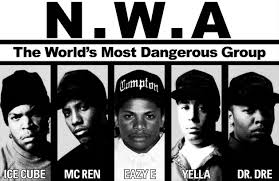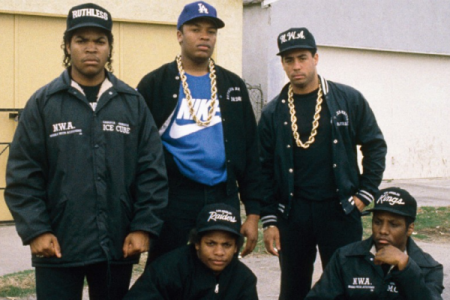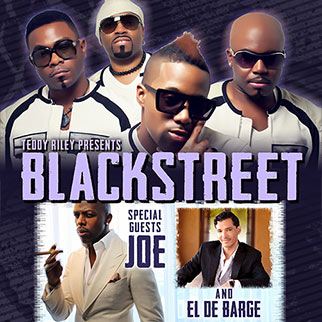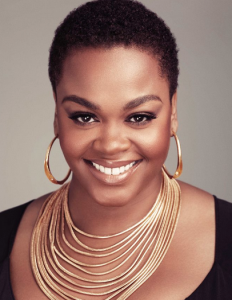I was a junior in high school, safely ensconced in North Texas suburia and youthful naivete when I discovered the music of NWA. The hardcore beats and clever sampling in their songs was what drew my attention at first, but what ultimately earned my support were the rhymes. The verses were more than catchy couplets about a California city far, far away: they became, in my sheltered world, a vicarious introduction to the harsh and deadly realities of police brutality and street life.
In retrospect, the vivid descriptions of violence and rampant profanity used by Dr. Dre, Ice Cube, MC Ren, DJ Yella and Eazy E probably didn’t win my parents’ approval, but the messages in the music were as educational as they were unrelenting. Detractors might have scoffed at the threatening demeanor, jheri curls and perpetual LA Raider gear, but the knowledge dropped in rhymes like “Dopeman,” “Gangsta Gangsta” and “[Expletive] The Police,” coupled with crisp production value and charismatic delivery, made the lessons all the more powerful.
 I recently attended a press screening for the just-released biopic about NWA that shares a title with their pioneering sophomore album, Straight Outta Compton. Beginning in 1986 and focusing on their formative years in the gang-infested, drug-fueled streets of Compton, the film demonstrates how “the world’s most dangerous group” definitively popularized ‘gangsta rap’ and permanently positioned the West Coast with the genre of hip-hop once dominated by New York.
I recently attended a press screening for the just-released biopic about NWA that shares a title with their pioneering sophomore album, Straight Outta Compton. Beginning in 1986 and focusing on their formative years in the gang-infested, drug-fueled streets of Compton, the film demonstrates how “the world’s most dangerous group” definitively popularized ‘gangsta rap’ and permanently positioned the West Coast with the genre of hip-hop once dominated by New York.
As a fan, I found the film to be—as rap pioneer KRS-One would call it—‘edutaining,’ if not entirely transparent. It was fascinating to learn, for example, that the late group founder and owner of Ruthless Records, Eric “Eazy-E” Wright, wasn’t always a rapper and had to be coached by Dr. Dre on his delivery for the now-classic song “Boyz-N-Tha-Hood.” Also, it was common knowledge that O’Shea Jackson, aka Ice Cube, wrote a majority of their smash hits, but many may not have been aware how hard he had to struggle against Eazy and group’s one-time manager, music exective Jerry Heller, to simply get paid. “They’re eating steak and lobster,” fumes Ice Cube (portrayed by his lookalike son, O’Shea Jackson Jr.) to his tour mates, “while we’re out here with the Fatburgers.” 
For all its competent acting, heartfelt moments and riveting performances of their biggest hits (“Express Yourself,” “Dopeman,” “Boyz-N-Da-Hood,” etc.), there was an alarming omission of the assaults of which Dr. Dre (Andre Young) has been accused. His ex-girlfriend Michel’le, former Ruthless Records artist and star of the TV One’s R&B Divas: Los Angeles, recently went public with allegations of physical violence. And one-time Pump It Up video rap show host, Dee Barnes, sued Young after he attacked her in 1991. Given the man’s undisputed record of abuse, the filmmakers’ decision to only portray Marion “Suge” Knight as violent onscreen seemed disingenuous.
….Compton’s portrayal of the rise and fall of NWA wasn’t without the usual music industry pitfalls (groupies, drug use), incuding the tragic death of Eazy-E, who contracted AIDS. But since we all mature eventually, the reminders of the NWA’s looming legacy and importance within hip-hop culture induced admiration and pride. The one-time ‘boyz-n-the-hood’ are now husbands, fathers, film-makers and businessmen, their cultural influence intact and their long-ago mission ‘to be legit’ fully realized for the world to see.






